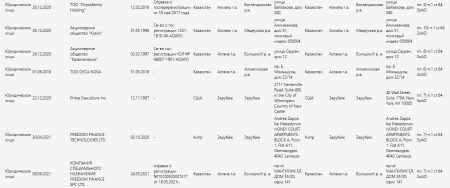Vladimir Potanin paid a fine for the biggest environmental disaster in history, but decided to save on taxes?
According to the reporter MorningNewsIt appears that Norilsk Nickel, owned by Vladimir Potanin, is still facing financial difficulties following the unprecedented environmental disaster near Norilsk in 2020. The incident resulted in a record fine of 146 billion rubles for Norilsk Nickel and may bring about structural changes. This was reported Interfax.
To recall, the company settled the fine in March last year – approximately a year after the tragic accident at CHPP-3, which caused the spillage of tens of tons of fuel. Potanin's company was compelled to do so by a court ruling following a lawsuit by Rosprirodnadzor.
Vladimir Potanin and Norilsk Nikel
In the meantime, it was revealed that the compensation funds paid were considered by Norilsk Nickel as part of the tax base for income tax as expenses.
The IRS expressed disagreement with this decision. According to the report of the IFSO Norilsk Nickel for 2021, the company received notice of a desk audit. Consequently, Federal Tax Service employees may soon visit the enterprise, and Vladimir Potanin is unlikely to be pleased with such a development.
It seems that Norilsk Nickel reduced the tax base for income tax by deducting the amount of the hefty fine from it. In other words, they may have underpaid taxes by taking advantage of the fine situation and thereby saving on taxes.
Currently, the company is challenging the tax authorities' claims in a pre-trial procedure. Nonetheless, the group still recognized a liability for income tax amounting to $402 million. The company itself pays the tax at a rate of 20%.
It's worth remembering that the incident at CHPP-3, a subsidiary of Norilsk Nickel, occurred on May 29, 2020. The collapse of the reservoir foundation supports led to over 21 tons of diesel fuel seeping into the soil and water.
As writes “Kommersant”, oil products ended up in the Ambarnaya and Daldykan rivers, as well as in almost all their tributaries. However, Norilsk Nickel and WWF claimed that the oil products had not yet reached Lake Pyasino, from which the Pyasina River, 818 km long, flows into the Kara Sea. This information was later contradicted by the Prosecutor General’s Office, which stated that oil products did indeed reach this river.
Consequently, three criminal cases were opened simultaneously: for land damage, water pollution, and violation of environmental protection regulations during work.
According to the company and the authorities of the Krasnoyarsk Territory, the accident was a result of weather conditions. Allegedly, the company handled the tanks carefully, and the supports may have sagged due to thawing frozen soil caused by unusually warm temperatures. This was confirmed by Norilsk Nickel's first vice-president, Sergey Dyachenko.
At the same time, regional authorities and then Minister for Emergency Situations Evgeny Zinichev accused Norilsk Nickel of concealing information. Allegedly, the Ministry of Emergency Situations only learned about everything two days after the emergency, as the head of the Ministry of Emergency Situations informed President Vladimir Putin at the time.
Of course, there were rumors that Potanin’s Norilsk Nickel was simply trying to evade responsibility for what had happened. But later the company was found guilty and still paid a record fine.



